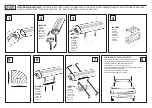
535
8-2. Steps to take in an emergency
8
Whe
n
tr
ouble
ar
ises
European regulations.
●
Use a genuine battery specifically
designed for use with the Stop &
Start system or a battery with
equivalent specifications to a gen-
uine battery. If an unsupported
battery is used, Stop & Start sys-
tem functions may be restricted to
protect the battery.
Also, battery performance may
decrease and the engine may not
be able to restart. Contact your
Toyota dealer for details.
●
Use a battery that the case size is
same as the previous one (LN3),
20 hour rate capacity (20HR) is
equivalent (65Ah) or greater, and
performance rating (CCA) is
equivalent (603A) or greater.
• If the sizes differ, the battery can-
not be properly secured.
• If the 20 hour rate capacity is low,
even if the time period where the
vehicle is not used is a short time,
the battery may discharge and the
engine may not be able to start.
●
For details, consult your Toyota
dealer.
WARNING
■
When removing the battery
terminals
Always remove the negative (-)
terminal first. If the positive (+) ter-
minal contacts any metal in the
surrounding area when the posi-
tive (+) terminal is removed, a
spark may occur, leading to a fire
in addition to electrical shocks
and death or serious injury.
■
Avoiding battery fires or
explosions
Observe the following precautions
to prevent accidentally igniting the
flammable gas that may be emit-
ted from the battery:
●
Make sure each jumper cable is
connected to the correct termi-
nal and that it is not unintention-
ally in contact with any other
than the intended terminal.
●
Do not allow the other end of
the jumper cable connected to
the “+” terminal to come into
contact with any other parts or
metal surfaces in the area, such
as brackets or unpainted metal.
●
Do not allow the + and - clamps
of the jumper cables to come
into contact with each other.
●
Do not smoke, use matches,
cigarette lighters or allow open
flame near the battery.
■
Battery precautions
The battery contains poisonous
and corrosive acidic electrolyte,
while related parts contain lead
and lead compounds. Observe
the following precautions when
handling the battery:
●
When working with the battery,
always wear safety glasses and
take care not to allow any bat-
tery fluids (acid) to come into
contact with skin, clothing or the
vehicle body.
●
Do not lean over the battery.
●
In the event that battery fluid
comes into contact with the skin
or eyes, immediately wash the
affected area with water and
seek medical attention. Place a
wet sponge or cloth over the
affected area until medical
attention can be received.
●
Always wash your hands after
handling the battery support,
terminals, and other bat-
tery-related parts.
●
Do not allow children near the
battery.
www.carobook.com
Summary of Contents for COROLLA CROSS
Page 22: ...22 Pictorial index www carobook com ...
Page 74: ...74 1 4 Theft deterrent system www carobook com ...
Page 140: ...140 Utility vehicle precautions 276 4 Driving www carobook com ...
Page 325: ...325 5 4 Other settings 5 Audio code 4 digit number for 10 min utes www carobook com ...
Page 402: ...402 5 16 Connected Services Overview work reception level www carobook com ...
Page 408: ...408 5 18 Toyota apps settings www carobook com ...
Page 444: ...444 6 4 Other interior features www carobook com ...
Page 540: ...540 8 2 Steps to take in an emergency www carobook com ...
Page 583: ...583 Index What to do if Trouble shooting 584 Alphabetical Index 587 www carobook com ...
Page 602: ...602 Engine immobilizer system Certifications www carobook com ...
Page 603: ...603 Wireless remote control system www carobook com ...
Page 604: ...604 Smart key system www carobook com ...
Page 605: ...605 Intuitive parking assist www carobook com ...
Page 606: ...606 Millimeter wave radar sensor www carobook com ...
Page 607: ...607 www carobook com ...
Page 608: ...608 Tire pressure warning system www carobook com ...
Page 609: ...609 BSM Blind Spot Monitor www carobook com ...
Page 610: ...610 www carobook com ...
Page 611: ...611 www carobook com ...
















































